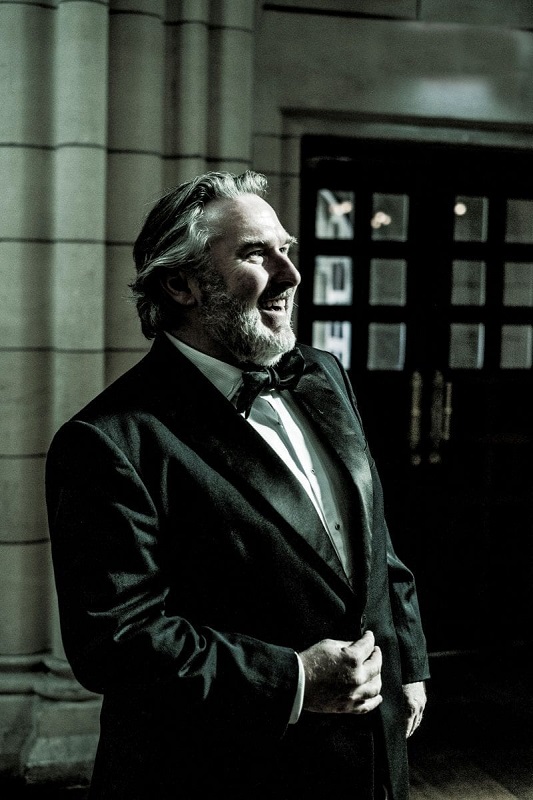Honouring Beethoven in Manchester is a united enterprise, at least between the Hallé and BBC Philharmonic, two symphony orchestras that have worked out a series of Beethoven specials between them. Last night’s Hallé concert even had two conductors – the Hallé’s music director Sir Mark Elder to direct Act Two of Fidelio and the vocal trio with orchestra Tremate, Empi, Tremate, and the Philharmonic’s principal guest conductor Ben Gernon in charge for the Eighth Symphony.
There’s a theme here: all of them were (in their final versions) first performed in 1814 – but they come from very different times and backgrounds. Tremate, Empi, Tremate – a real rarity, probably being heard for the first time ever in Manchester – dates back to 1802, before the ‘Eroica’ symphony, after Beethoven had been taking advice from Salieri about how to set Italian texts.
 Salieri? Well, maybe he wasn’t such a duffer after all, if this piece reflects his imparted skills. Taken from an operatic text where a king jealously threatens two young lovers, it’s for soprano (Gemma Summerfield, pictured right by Scott Cadenhead) and tenor (Ben Johnson), and contains a lovely central slow section where the voices weave together as the music develops and violins decorate the plaintive closing themes – and a dramatic final movement. Sir Mark, conducting an orchestra of 36 strings (and there are no oboes), drew limpid, Italianate sounds from this, and Gemma Summerfield’s voice glided effortlessly over the whole texture.
Salieri? Well, maybe he wasn’t such a duffer after all, if this piece reflects his imparted skills. Taken from an operatic text where a king jealously threatens two young lovers, it’s for soprano (Gemma Summerfield, pictured right by Scott Cadenhead) and tenor (Ben Johnson), and contains a lovely central slow section where the voices weave together as the music develops and violins decorate the plaintive closing themes – and a dramatic final movement. Sir Mark, conducting an orchestra of 36 strings (and there are no oboes), drew limpid, Italianate sounds from this, and Gemma Summerfield’s voice glided effortlessly over the whole texture.
The string body was up to 40 for the symphony, conducted by Ben Gernon and delivered with crisp energy, catching both its intricate and sometimes comic interplay of musical units and its driving force. There is, after all, a triple forte in its first movement as well as multitudes of other accentuations – all neatly played – throughout, and the wind and brass were allowed to dominate a lot, particularly in the minuet third movement. The finale went at a flying pace, coming over as a kind of scherzo in four-time (there are an awful lot of triplets written into that metre), which wrapped the whole thing up in unified style.
Elder returned for the Fidelio act, and (as well as the singers already mentioned as Don Fernando, Marzelline and Jaquino) he had a magnificent line-up for his principals: Simon O’Neill (pictured below) as Florestan, Brindley Sherratt as Rocco, Rachel Nicholls as Leonore, and Derek Welton as Pizarro.
 As with some of Elder’s other opera presentations in Manchester, there was scope for acting, too, as they donned sufficient costuming to convey their roles and treated the platform as their stage, while the progress of the story was outlined in English by James Platt, speaking from a desk as if reviewing it all in an official report after the event.
As with some of Elder’s other opera presentations in Manchester, there was scope for acting, too, as they donned sufficient costuming to convey their roles and treated the platform as their stage, while the progress of the story was outlined in English by James Platt, speaking from a desk as if reviewing it all in an official report after the event.
But the music was centre-stage throughout, from the stabbing attack of the orchestral prelude onwards. O’Neill has the kind of Heldentenor tone that can pierce even the strongest orchestral blast, and he needed it – as well as a beautifully lyrical tone in his “In des Lehens Frühlingstagen”. Nicholls brought outstanding passion to her Leonore, and Sherratt had no trouble in being heard distinctly – the clarity of his tone and diction as always a delight. Welton’s Pizarro was suitably nasty in characterization, and the final scene boasted both a sweet orchestral quartet of wind principals from the Hallé and an ensemble sound from the front of the stage that was remarkable – Gemma Summerfield’s contribution not the least among them – while the Hallé Choir provided sterling support from the heights beyond. It was the kind of sound Elder could whip up to a truly Beethovenian fire of conviction by its close.















Add comment